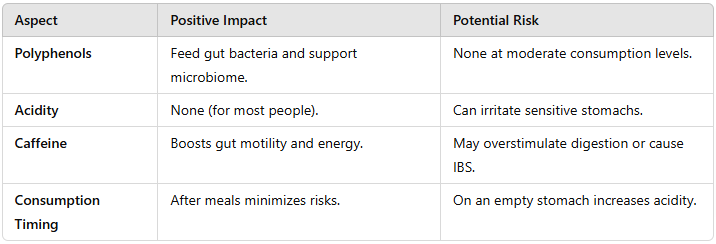
For millions, coffee is a non-negotiable part of their morning routine. This aromatic beverage jumpstarts the day, sharpens focus, and provides a comforting ritual.
While coffee boasts many health benefits, including antioxidant properties and enhanced metabolism, it also raises questions about its effects on gut health.
Does your daily cup of joe nurture your digestive system, or could it be doing more harm than good?
1. Coffee and Digestion
Coffee contains a complex mix of compounds, including:
- Caffeine: A natural stimulant that affects gut motility.
- Chlorogenic Acids: Found in high concentrations, contributing to coffee’s acidity.
- Polyphenols: Antioxidants that may benefit gut bacteria.
When consumed, coffee stimulates stomach acid production, jumpstarting digestion. However, this stimulation can be a double-edged sword.
2. The Positive Impacts of Coffee on Gut Health
– Polyphenols and Prebiotics
Polyphenols in coffee act as prebiotics, feeding beneficial gut bacteria. A study found that moderate coffee consumption promotes a balanced gut microbiome by enhancing bacterial diversity.
– Antioxidants and Gut Lining Protection
Coffee’s antioxidants may help protect the gut lining from oxidative stress and inflammation, reducing the risk of conditions like leaky gut.
– Improved Digestion
For some, coffee acts as a mild laxative, aiding regular bowel movements and relieving constipation.
3. The Potential Downsides of Coffee for Gut Health
– Acidity and Acid Reflux
Coffee’s low pH can irritate the stomach lining, particularly in individuals prone to acid reflux or ulcers. A study found a correlation between high coffee consumption and increased episodes of acid reflux in sensitive individuals.
– Overstimulation of Gut Motility
Caffeine overstimulates the digestive system, potentially causing diarrhea or loose stools. While this effect can be helpful for some, it’s uncomfortable for others.
– Worsening IBS Symptoms
Coffee may aggravate symptoms in individuals with Irritable Bowel Syndrome (IBS), especially when consumed on an empty stomach.
4. Factors That Determine Coffee’s Impact
– Quantity
Excessive coffee consumption (more than 3–4 cups daily) increases the likelihood of adverse effects on gut health.
– Timing
Drinking coffee on an empty stomach amplifies its acidity, potentially causing discomfort. Having it after a meal can mitigate these effects.
– Type of Coffee
- Filtered coffee: Reduces compounds like diterpenes, which may irritate the gut.
- Decaffeinated coffee: Offers a gut-friendly alternative without caffeine’s overstimulation.
– Individual Sensitivities
Factors such as lactose intolerance (when adding milk) or sensitivity to specific coffee additives can influence gut reactions.
5. Tips for Gut-Friendly Coffee Consumption
- Opt for Low-Acid Coffee: Brands that specifically cater to sensitive stomachs, such as cold brews or dark roasts, have lower acidity.
- Pair with Food: Having coffee with breakfast reduces its acidic impact.
- Switch Additives: Use plant-based milks like almond or oat milk, which are easier on digestion.
- Limit Additives: Avoid excessive sugar or artificial sweeteners, which may disrupt gut bacteria.
- Moderate Your Intake: Stick to 1–2 cups per day to enjoy the benefits without overloading your system.
6. Gut-Friendly Coffee Recipe
- Ingredients: Cold-brew coffee, oat milk, cinnamon, and a touch of honey.
- Why it works: Cold-brew reduces acidity, oat milk is gut-friendly, cinnamon has anti-inflammatory properties, and honey is a natural sweetener.

Coffee can be both a friend and a foe to your gut health.
Its polyphenols and antioxidants promote a healthy gut microbiome, but its acidity and caffeine content can cause irritation for some.
By tailoring your coffee habits — choosing low-acid options, moderating intake, and pairing with food — you can enjoy your morning ritual without compromising your digestive health.
Remember, gut health is deeply personal.
If coffee consistently causes discomfort, experiment with alternatives like herbal teas or consult a healthcare professional for guidance. With a mindful approach, your daily brew can support both your energy and your gut!









